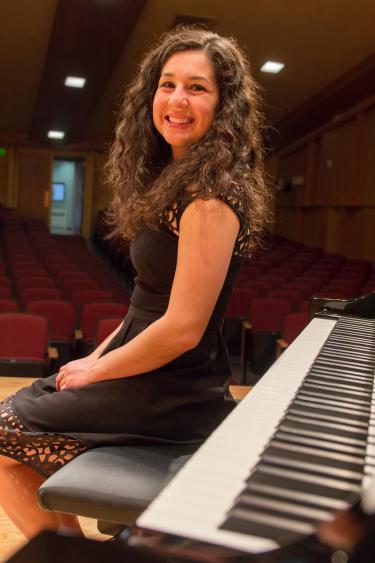Elana Weiner graduated from CU Boulder with a Bachelor of Arts in Music – Piano Performance and a minor in Jewish Studies. She served as the 2017-2018 valedictorian in Jewish Studies. Below is her valedictory speech, which she gave via video at the Jewish Studies Graduation Ceremony on May 10, 2018.
 Good afternoon, I am so very humbled an honored to be the Program in Jewish Studies 2018 Valedictorian. I am unfortunately not able to attend this ceremony as my College of Music graduation is happening now so instead of standing in front of you in person, I am on a screen.
Good afternoon, I am so very humbled an honored to be the Program in Jewish Studies 2018 Valedictorian. I am unfortunately not able to attend this ceremony as my College of Music graduation is happening now so instead of standing in front of you in person, I am on a screen.
I was talking recently with Meghan, the Jewish Studies Executive Manager when she told me about the time she first met me. I realized I had absolutely no recollection. Apparently, I walked into a Majors and Minors Fair on campus and walked right up to the Program in Jewish Studies table and said, “I would like to declare a minor.” And I guess that was it. I have been a minor ever since.
However, my journey in Jewish Studies didn’t start when I declared my minor. It began as a child when my attendance at Sunday school and Hebrew school was non-negotiable. I never particularly enjoyed sitting in a dry, cold classroom but what I did enjoy was learning about all things Jewish. I enjoyed learning the Hebrew alphabet, even though it only helped prepare me for my Bat Mitzvah. I knew the difference between a knish, a knaidle, and a kreplach. We covered our gefilte fish in chraine, Yiddish for horseradish. We celebrated all the holidays, ate matzah for eight days straight, honored the Sabbath every Friday complete with homemade challah, didn’t mix milk and meat and ate strict kosher at home. Surely, I was Jewishly literate.
It wasn’t until I took my first Jewish Studies classes in Hebrew and Intro to Jewish Culture that I realized not everyone eats cholent, a type of meaty stew, on Shabbat. I remember watching an old Israeli movie, “Salach Shabbati,” in which the actor Topol (who everyone knows as Tevye from Fiddler on the Roof) plays a Mizrachi Jew, who was originally from the Middle East and moves to Israel with his family. This movie really opened up my outlook on Jewish life and culture as there are many different types of Jews living around the world and I had absolutely no idea Mizrachi Jews are a marginalized minority population in Israel (which is kind of ironic since they are Middle Eastern Jews and Israel is the in Middle East). I realized just how illiterate I was.
The Program in Jewish Studies enabled me to become more “literate,” not just about Jewish food and rituals, but about Jewish history, literature, and culture as a whole. After taking three years of Hebrew, I can successfully find my way around Israel. My mother and I speak in simple Hebrew sentences when we don’t want other people listening to our conversations, such as standing in the grocery line when the checkout clerk takes forever. After attending this year’s Embodied Judaism Symposium on the Shekinah, I understand that many people interpret Hashem in different ways. As I listened to Rabbi Tirzah Firestone talk on the feminine qualities of the Shekinah, I realized that God is open to interpretation. This idea of an open interpretation of God was re-enforced when I took Jewish history. The Israelites turned to religion for answers on how to cope with the hardships of life and survival. The interpretations of the Torah have lasted thousands of years and yet the Torah is still open to interpretation. Jewish literacy is truly a continual process.
The Program in Jewish Studies has helped shape my worldview and outlook on life. It created a small community in which I could thrive. It enabled me to work closely with my professors and various other Jewish Studies students and has greatly shaped my college career. It has allowed me to become a more “literate” Jew and for that, I am forever grateful.
